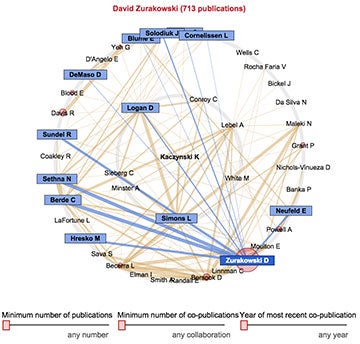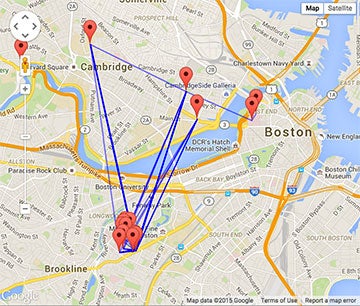News & Highlights
Topics: Collaboration & Team Science, Open-source Data Tools, Research Resources
Degrees of Separation
Harvard Catalyst Profiles facilitates collaborations and builds community.

While social media is increasingly used to engage students, faculty and staff across Harvard, there’s one tool that acts as both directory and connector: Harvard Catalyst Profiles. With the primary goal of connecting faculty across disciplines and specialties, the website serves approximately 24,000 researchers at Harvard Medical School, Harvard School of Dental Medicine and the Harvard T.H. Chan School of Public Health.
Sponsored by Harvard Catalyst | The Clinical and Translational Science Center and developed in 2008 by Griffin Weber, HMS assistant professor of medicine in the Department of Biomedical Informatics and Beth Israel Deaconess Medical Center, Harvard Catalyst Profiles began as a simple directory of faculty but grew steadily into an expansive research networking engine that now receives 3,000 daily visitors.
“We wanted to help investigators showcase their research and build new collaborations,” said Weber. “Something like social networking for scientists.”
Profile pages exist for current faculty and are automatically created by the software when new faculty are appointed at any of the three Longwood schools. The website compiles job titles, affiliation and contact details from PeopleSoft; pulls publication data from PubMed; and draws information on mentoring opportunities and laboratory resources from internal administrative databases.
Faculty can enhance their respective profiles by adding a photo, a research narrative, awards, links to other websites, press releases and news articles, videos, Twitter feeds, and presentations through SlideShare.
Powered by advanced text processing and medical thesauri, a keyword search can yield multiple names, publications and networks. Results can be grouped by those working in the same or similar research areas and geographic proximity to one another.
Drawing from the content on a faculty member’s page, Harvard Catalyst Profiles determines the researcher’s area of expertise and lists co-authors of papers; it also identifies faculty who are connected in a variety of ways, such as through research interests, department or geographic location. Interactive visualizations of this information enable users to explore the many ways faculty are interconnected.
Finding experts using Harvard Catalyst Profiles
Powered by advanced text processing and medical thesauri, a keyword search can yield multiple names, publications and networks. Results can be grouped by those working in the same or similar research areas and geographic proximity to one another. For example, a search for “asthma” returns nearly 1,000 researchers.
To help users learn more about those matching faculty, the word “why?” appears next to each person’s name and links to a list of publications that person author or co-author about the search phrase.
 Drilling down further into the person’s profile reveals a graphed timeline showing when those articles were published, and a Google map displays where other similar faculty are physically located.
Drilling down further into the person’s profile reveals a graphed timeline showing when those articles were published, and a Google map displays where other similar faculty are physically located.
Ingrid Katz, HMS assistant professor of medicine at Brigham and Women’s Hospital, can attest to the power of Harvard Catalyst Profiles. Upon receiving her first Catalyst KL2 Merit Award in 2008, Katz began using the tool to identify mentors for her research on social determinants of health behavior.
“Harvard Catalyst Profiles gives a really good sense of who these researchers are,” said Katz. “It’s the only place where you can find comprehensive information on someone and what their focus is.”
Katz has used the tool to solicit speakers for events sponsored by the Division of Women’s Health, including the biannual Global Women’s Health Research Retreat, and also for events of the Joint Committee on the Status of Women at HMS.
For Katz, the Profiles tool has been a good way to find people who are not in her direct peer group. “The people who are new to me are folks at the school of public health,” says Katz. “But I’ve also found people at my own institution or even Mass General.”
“I’ve certainly found people whom I’ve approached with research questions,” said Katz. “I’ve been particularly interested in finding people who do behavioral science, with a focus on health impact.” For example, she found Ichiro Kawachi, the John L. Loeb and Frances Lehman Loeb Professor of Social Epidemiology at the Harvard Chan School and an HMS associate professor of medicine at Brigham and Women’s Hospital, whose behavioral economics course she recently audited to better inform her own research.
Harvard Catalyst Profiles has been crucial not only in broadening Katz’s network, but also in enabling her to make her own research accessible to others.
“I make sure I update my profile regularly,” added Katz. “I want people to be able to find me.”
It’s this kind of scientist engagement and involvement with the website that Weber and the rest of the team at Harvard Catalyst are hoping to cultivate.
Engaging the community
“As we continue to add new features to Harvard Catalyst Profiles, we want to make sure we capture the range of scholarly activities that faculty engage in,” said Weber. “PubMed articles are just one part of it. We will soon begin adding information about grants and patents. However, it is also important for faculty to post links to their personal websites, connect to their Twitter feeds or embed presentations and videos, since this helps us create a more complete picture of their research.”
As more faculty enhance their profiles, people from within and beyond the Harvard community will be able to mine a richer source of expertise for mentors, speakers and collaborators.
“We know that the vast majority of traffic behind Harvard Catalyst Profiles, nearly 3,000 people a day, is from elsewhere in the world,” explained Weber. “It’s how people are learning about the faculty here at Harvard.” In addition, more than 30 other universities across the country have adopted the software for their own research communities.
By encouraging these global networks, Harvard Catalyst Profiles is well on its way to fulfilling its mission of connecting people and fostering collaboration within the sciences.

